Unit 12 You’re supposed to shake hands.Section B
文档属性
| 名称 | Unit 12 You’re supposed to shake hands.Section B |
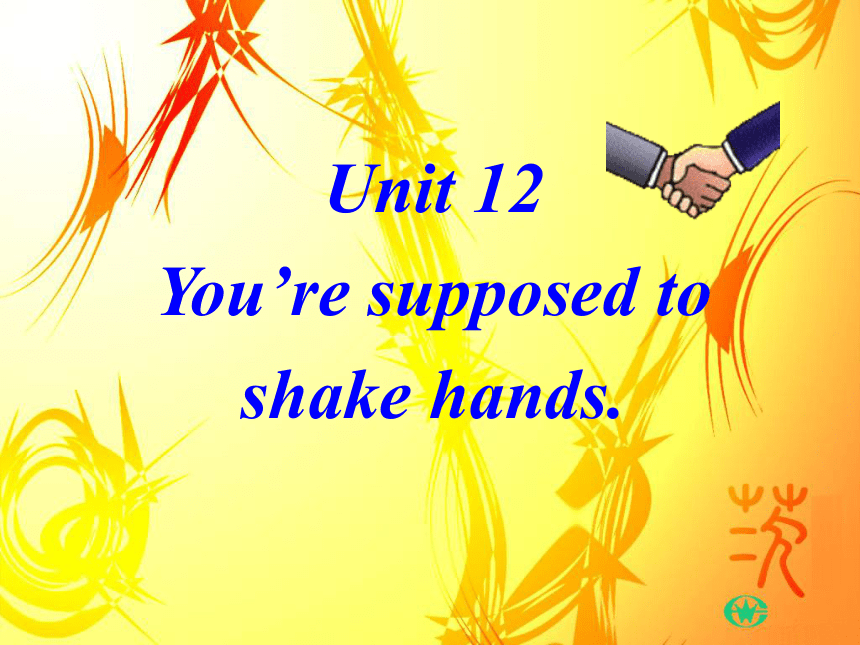
|
|
| 格式 | rar | ||
| 文件大小 | 7.4MB | ||
| 资源类型 | 教案 | ||
| 版本资源 | 人教新目标(Go for it)版 | ||
| 科目 | 英语 | ||
| 更新时间 | 2011-03-19 00:00:00 | ||
图片预览

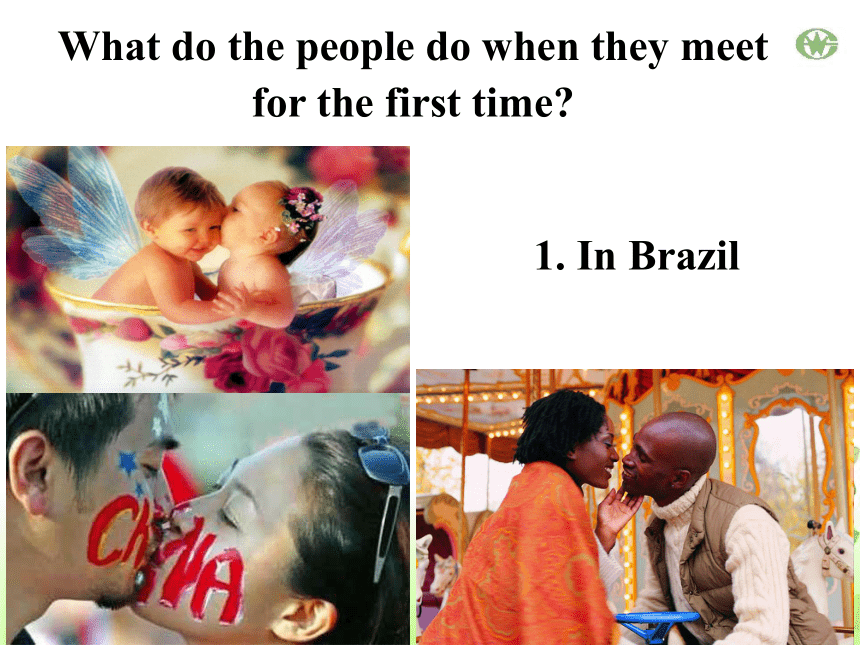

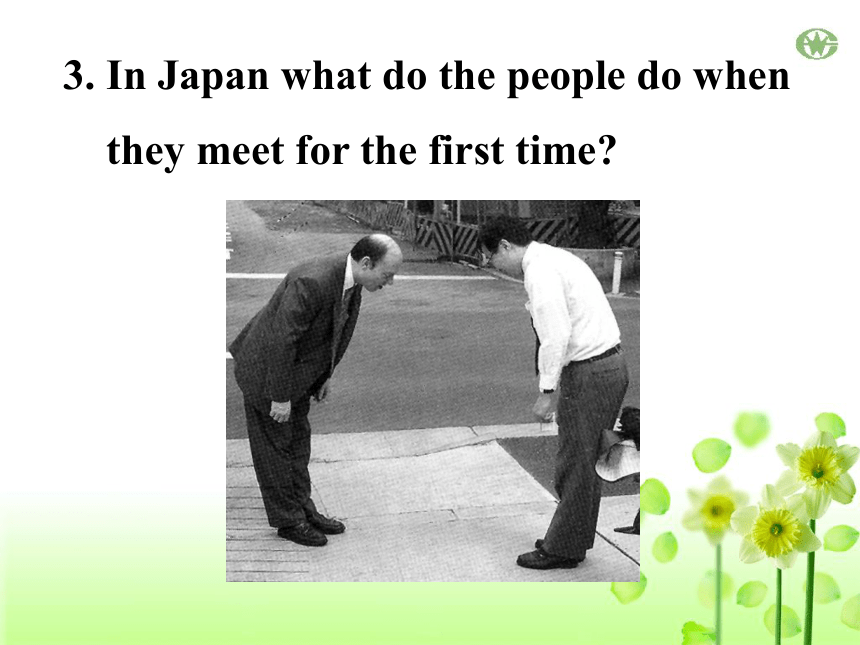

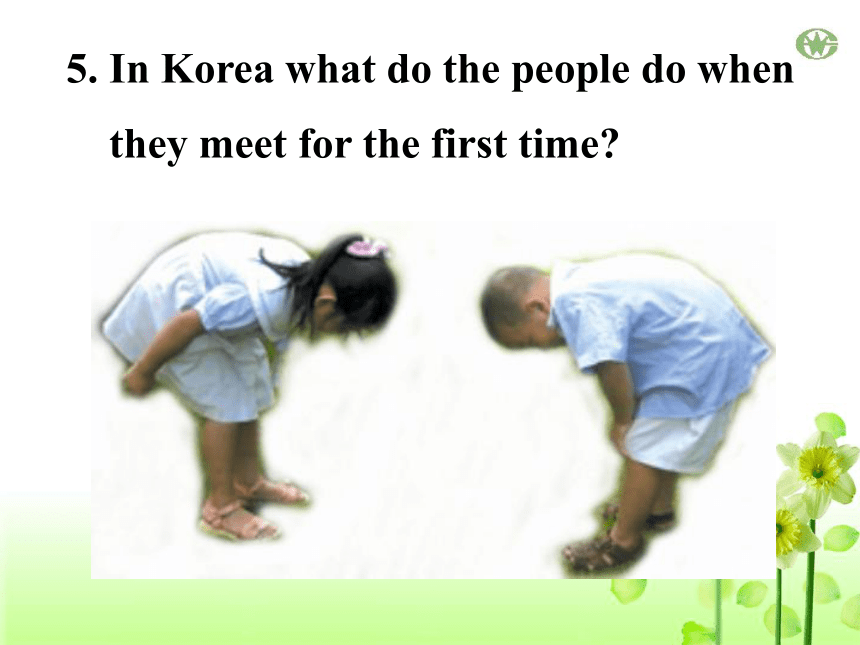

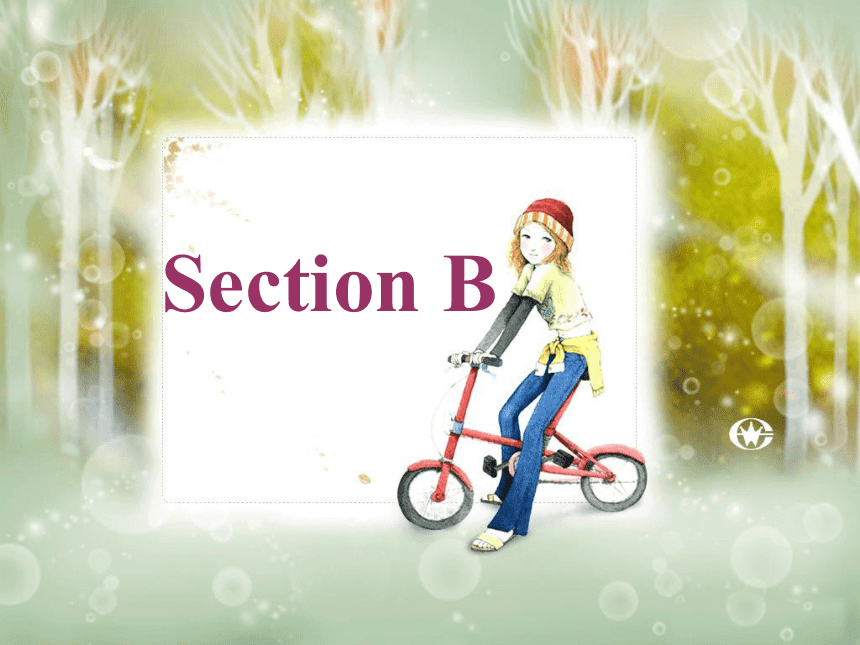

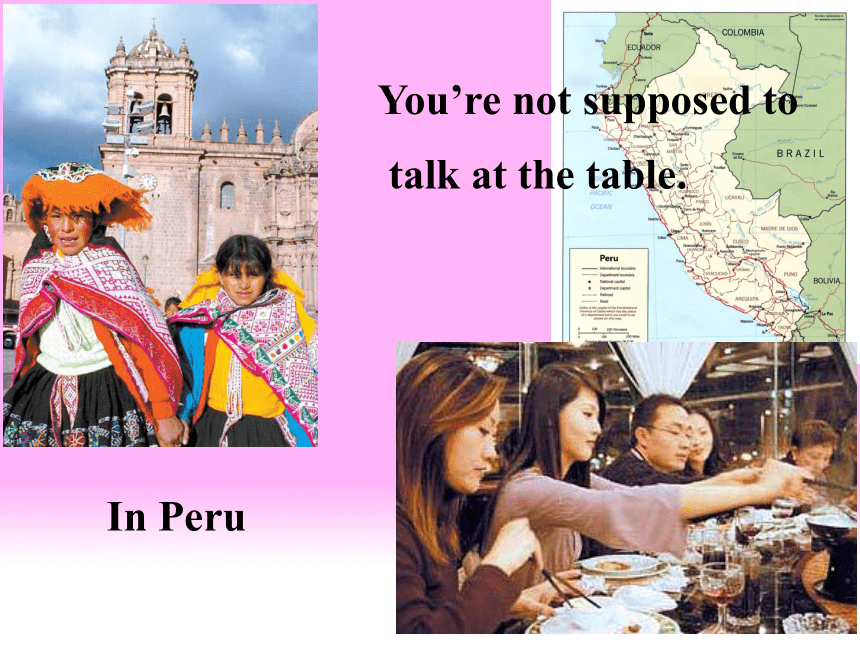


文档简介
课件52张PPT。Unit 12
You’re supposed to shake hands.What do the people do when they meet for the first time? 1. In Brazil2. In the United States what do the
people do when they meet for the
first time? 3. In Japan what do the people do when
they meet for the first time? 4. In Mexico what do the people do
when they meet for the first time? 5. In Korea what do the people do when
they meet for the first time? We put hands together in front of the chest.What are people in India supposed to do when they meet for the first time?Section BIn the United States, you’re not supposed to eat with your hands.In PeruYou’re not supposed to
talk at the table.In China, you’re not supposed to pick up your bowl of rice.In Korea, the youngest person
is supposed to start
eating first.In Brazil, you should wipe your mouth with your napkin every time you take a drink.You aren’t supposed to eat or drink while walking down the street. It’s polite to make noise while eating noodles. 1.Why was Wang Kin nervous before she arrived in France?Her French was not very good.3a Reading2. Why did she have no reason to be nervous?Her host family was really nice.3.What differences have occurred in her French?Her French has improved.4. What does she find surprising?You put your bread on the tables not on the plate.5. What is one particular challenge she is facing?One particular challenge is learning how to behave at the dinner table.1.table manners 餐桌礼仪
manner 是 “礼貌”的意思, 常以复数
形式出现。 如:
It’s bad manners to talk with a full
mouth.
嘴里吃着东西说话是不礼貌的。Explanations manner 还可以表示 “风俗;习惯”,
也常以复数形式出现。 如:
The manners of the ancient Egyptians
古埃及的风俗习惯
manner 还可以表示 “方法;方式”
“态度;举止”等意思。如: Don’t you think that David has got a very arrogant manner?
你难道不觉得戴维的态度很傲慢吗?
Why are you talking in such a strange manner?
你为什么用这种奇怪的方式谈话。2. My biggest challenge is learning
how to behave at the dinner table.
我最大的挑战是学会餐桌上的礼仪。
behave 动词,意思是 “行为举止; 举止” The boy behaved very well last night.
孩子昨天晚上表现挺好。
The teacher encouraged the children to behave well and not to be a discredit to the collective.
老师鼓励孩子们表现得好一些,不要给集体丢脸。 The little boy behaved with great encourage in the face of gunman.
在持枪歹徒面前,这个小男孩表现得极有勇气。
它还可以表示 “守规矩;举止适当有礼”的意思。如:
Please behave yourself. 请礼貌点儿。 Will you children please behave!
你们这些孩子们能不能守规矩点。
它的相应的名词是behavior, 意思
是 “行为”。如:3....but I am used to it.
词组 get/be used to 意思是 “习惯
于……”词组中的 to 是介词 其后如果
跟动词 动词应该用动名词形式。
The astronauts soon got used
to the condition of weightlessness
太空人很快就习惯了失重状态。I’m getting used to the cold weather.
我开始习惯寒冷的天气。
She gets used to driving a small car.
她习惯开一辆小车。
He will get used to getting up early.
他将习惯于早起。Writing
Table Manners in China Talking about eating habit, unlike the West, where everyone has their own plate of food, in China the dishes are placed on the table and everybody shares. Chinese are very proud of their culture of cuisine and will do their best to show their hospitality. And sometimes the host will serve some dishes with his or her own chopsticks to guests to show his or her hospitality. This is a sign of politeness. The appropriate thing to
do would be to eat the
whatever-it-is and
say how yummy it is. If you feel uncomfortable with this, you can just say a polite "thank you" and leave the food there. There some other rules that are suggested you follow to make your stay in China happier, though you will be forgiven if you have no idea of what they are. 1. Never stick your chopsticks upright in the rice bowl, lay them on your dish instead. Otherwise, it is deemed extremely impolite to the host and seniors present. The reason for this is that when somebody
dies, the shrine to them
contains a bowl of sand or rice with two sticks of incense stuck upright in it. So if you stick your chopsticks in the rice bowl, it looks like the shrine and is equivalent to wishing death upon a person at the table. 2. Make sure the spout of the teapot is not facing anyone. It is impolite to set the teapot down where the spout is facing towards somebody. The spout should always be directed
to where nobody is sitting,
usually just outward from
the table. 3. Don't tap on your bowl with your chopsticks, since that will be deemed insult to the host or the chef. Beggars tap on their bowls, and also, when the food is coming too slow in a restaurant, people will tap their bowls. If
you are in someone's
home, it is like insulting
the host or the cook. 4. Never try to turn a fish over and debone it yourself, since the separation of the fish skeleton from the lower half of the flesh will usually be performed by the host or a waiter. Superstitious people deem bad luck will ensue and a fishing boat will capsize if you do so. This is especially true to southerners in China (to be specific, such as Guangdong, Guangxi and Fujian provinces, etc.), since, traditionally, southerners are the fishing population. Put the following phrases in the
correct blanks.Exercise 1make noise while eating
point at others with chopstick
say hello to others
wipe your mouth after dinner
talk loudly at the tableIt’s rude to …It’s polite to ... 6. kiss or shake hands
7. meet without saying anything
8. arrive too late
9. shake hands when you first meet
someone
10. eat while walking in the streetHomework 根据提示词列举出几条作为学生在家
或在学校等应该做和不应该做的。
(参照所给句型,尽量选用不同句型。)smoke
do our homework
get our ears pierced
speak aloud in/on…
be polite to…
clean upstay up
be home by…
drive a car
wash the dishes
bring snakes to the classroom
choose our own clothesmake the bed by ourselves
run in the hallways
be late for school参考句型:
We are supposed to…/
We are not supposed to
We should / shouldn’t…
It’s polite/ rude to…We are allowed to…
/ We aren’t allowed to…
We can/ could/ can’t/ couldn’t…
Things we are supposed to do:Things we are supposed to do:
___________________________________________________________________________
___________________________________________________________________________
___________________________________________________________________________
___________________________________________________________________________
___________________________________________________________________________Things we aren’t supposed to do:
____________________________________________________________________________
____________________________________________________________________________
____________________________________________________________________________
____________________________________________________________________________
____________________________________________________________________________Thank you for listening!
You’re supposed to shake hands.What do the people do when they meet for the first time? 1. In Brazil2. In the United States what do the
people do when they meet for the
first time? 3. In Japan what do the people do when
they meet for the first time? 4. In Mexico what do the people do
when they meet for the first time? 5. In Korea what do the people do when
they meet for the first time? We put hands together in front of the chest.What are people in India supposed to do when they meet for the first time?Section BIn the United States, you’re not supposed to eat with your hands.In PeruYou’re not supposed to
talk at the table.In China, you’re not supposed to pick up your bowl of rice.In Korea, the youngest person
is supposed to start
eating first.In Brazil, you should wipe your mouth with your napkin every time you take a drink.You aren’t supposed to eat or drink while walking down the street. It’s polite to make noise while eating noodles. 1.Why was Wang Kin nervous before she arrived in France?Her French was not very good.3a Reading2. Why did she have no reason to be nervous?Her host family was really nice.3.What differences have occurred in her French?Her French has improved.4. What does she find surprising?You put your bread on the tables not on the plate.5. What is one particular challenge she is facing?One particular challenge is learning how to behave at the dinner table.1.table manners 餐桌礼仪
manner 是 “礼貌”的意思, 常以复数
形式出现。 如:
It’s bad manners to talk with a full
mouth.
嘴里吃着东西说话是不礼貌的。Explanations manner 还可以表示 “风俗;习惯”,
也常以复数形式出现。 如:
The manners of the ancient Egyptians
古埃及的风俗习惯
manner 还可以表示 “方法;方式”
“态度;举止”等意思。如: Don’t you think that David has got a very arrogant manner?
你难道不觉得戴维的态度很傲慢吗?
Why are you talking in such a strange manner?
你为什么用这种奇怪的方式谈话。2. My biggest challenge is learning
how to behave at the dinner table.
我最大的挑战是学会餐桌上的礼仪。
behave 动词,意思是 “行为举止; 举止” The boy behaved very well last night.
孩子昨天晚上表现挺好。
The teacher encouraged the children to behave well and not to be a discredit to the collective.
老师鼓励孩子们表现得好一些,不要给集体丢脸。 The little boy behaved with great encourage in the face of gunman.
在持枪歹徒面前,这个小男孩表现得极有勇气。
它还可以表示 “守规矩;举止适当有礼”的意思。如:
Please behave yourself. 请礼貌点儿。 Will you children please behave!
你们这些孩子们能不能守规矩点。
它的相应的名词是behavior, 意思
是 “行为”。如:3....but I am used to it.
词组 get/be used to 意思是 “习惯
于……”词组中的 to 是介词 其后如果
跟动词 动词应该用动名词形式。
The astronauts soon got used
to the condition of weightlessness
太空人很快就习惯了失重状态。I’m getting used to the cold weather.
我开始习惯寒冷的天气。
She gets used to driving a small car.
她习惯开一辆小车。
He will get used to getting up early.
他将习惯于早起。Writing
Table Manners in China Talking about eating habit, unlike the West, where everyone has their own plate of food, in China the dishes are placed on the table and everybody shares. Chinese are very proud of their culture of cuisine and will do their best to show their hospitality. And sometimes the host will serve some dishes with his or her own chopsticks to guests to show his or her hospitality. This is a sign of politeness. The appropriate thing to
do would be to eat the
whatever-it-is and
say how yummy it is. If you feel uncomfortable with this, you can just say a polite "thank you" and leave the food there. There some other rules that are suggested you follow to make your stay in China happier, though you will be forgiven if you have no idea of what they are. 1. Never stick your chopsticks upright in the rice bowl, lay them on your dish instead. Otherwise, it is deemed extremely impolite to the host and seniors present. The reason for this is that when somebody
dies, the shrine to them
contains a bowl of sand or rice with two sticks of incense stuck upright in it. So if you stick your chopsticks in the rice bowl, it looks like the shrine and is equivalent to wishing death upon a person at the table. 2. Make sure the spout of the teapot is not facing anyone. It is impolite to set the teapot down where the spout is facing towards somebody. The spout should always be directed
to where nobody is sitting,
usually just outward from
the table. 3. Don't tap on your bowl with your chopsticks, since that will be deemed insult to the host or the chef. Beggars tap on their bowls, and also, when the food is coming too slow in a restaurant, people will tap their bowls. If
you are in someone's
home, it is like insulting
the host or the cook. 4. Never try to turn a fish over and debone it yourself, since the separation of the fish skeleton from the lower half of the flesh will usually be performed by the host or a waiter. Superstitious people deem bad luck will ensue and a fishing boat will capsize if you do so. This is especially true to southerners in China (to be specific, such as Guangdong, Guangxi and Fujian provinces, etc.), since, traditionally, southerners are the fishing population. Put the following phrases in the
correct blanks.Exercise 1make noise while eating
point at others with chopstick
say hello to others
wipe your mouth after dinner
talk loudly at the tableIt’s rude to …It’s polite to ... 6. kiss or shake hands
7. meet without saying anything
8. arrive too late
9. shake hands when you first meet
someone
10. eat while walking in the streetHomework 根据提示词列举出几条作为学生在家
或在学校等应该做和不应该做的。
(参照所给句型,尽量选用不同句型。)smoke
do our homework
get our ears pierced
speak aloud in/on…
be polite to…
clean upstay up
be home by…
drive a car
wash the dishes
bring snakes to the classroom
choose our own clothesmake the bed by ourselves
run in the hallways
be late for school参考句型:
We are supposed to…/
We are not supposed to
We should / shouldn’t…
It’s polite/ rude to…We are allowed to…
/ We aren’t allowed to…
We can/ could/ can’t/ couldn’t…
Things we are supposed to do:Things we are supposed to do:
___________________________________________________________________________
___________________________________________________________________________
___________________________________________________________________________
___________________________________________________________________________
___________________________________________________________________________Things we aren’t supposed to do:
____________________________________________________________________________
____________________________________________________________________________
____________________________________________________________________________
____________________________________________________________________________
____________________________________________________________________________Thank you for listening!
同课章节目录
- Unit 1 How can we become good learners.
- Section A
- Section B
- Unit 2 I think that mooncakes are delicious!
- Section A
- Section B
- Unit 3 Could you please tell me where the restroom
- Section A
- Section B
- Unit 4 I used to be afraid of the dark.
- Section A
- Section B
- Unit 5 What are the shirts made of?
- Section A
- Section B
- Review of Units 1-5
- Unit 6 When was it invented?
- Section A
- Section B
- Unit 7 Teenagers should be allowed to choose their
- Section A
- Section B
- Unit 8 It must belong to Carla.
- Section A
- Section B
- Unit 9 I like music that I can dance to.
- Section A
- Section B
- Unit 10 You're supposed to shake hands.
- Section A
- Section B
- Review of Units 6-10
- Unit 11 Sad movies make me cry.
- Section A
- Section B
- Unit 12 Life is full of the unexpected
- Section A
- Section B
- Unit 13 We're trying to save the earth!
- Section A
- Section B
- Unit 14 I remember meeting all of you in Grade 7.
- Section A
- Section B
- Review of Units 11-14
